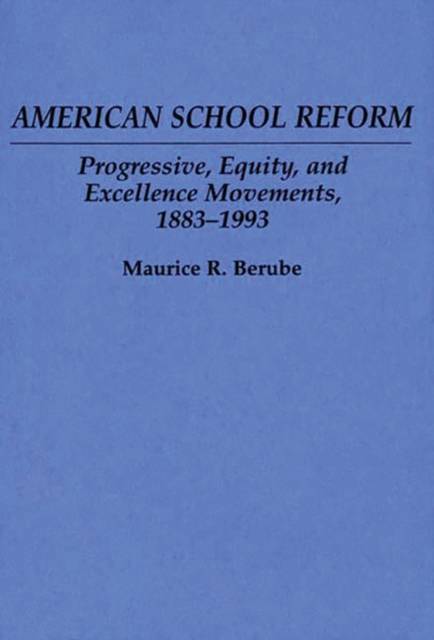
- Afhalen na 1 uur in een winkel met voorraad
- Gratis thuislevering in België vanaf € 30
- Ruim aanbod met 7 miljoen producten
- Afhalen na 1 uur in een winkel met voorraad
- Gratis thuislevering in België vanaf € 30
- Ruim aanbod met 7 miljoen producten
Zoeken
American School Reform
Progressive, Equity, and Excellence Movements, 1883-1993
Maurice R Berube, Maruice R Berube
Hardcover | Engels
€ 103,45
+ 206 punten
Omschrijving
Berube analyzes the three great educational reform movements in the United States. He shows how they have been shaped by outside societal forces: Progressive Education was an offshoot of the Progressive Movement; Equity Reform in the 1960s was influenced by the Civil Rights Movement; Excellence Reform in the last decade was a response to foreign economic competition. Within each matrix, common characteristics of each movement emerge. Progressive Education with its emphasis on critical thinking and child-centered schools set the stage for what was to follow. Equity Reform sought to complete the unfinished agenda of Progressive Education in educating the poor. Excellence Reform repudiated both in the name of higher standards and content-specific curriculums. The emergence of sophisticated educational research since the 1960s has influenced educational policy to be more research-based. Berube provides a necessary overview of the great movements in school reform over the last century.
Specificaties
Betrokkenen
- Auteur(s):
- Uitgeverij:
Inhoud
- Aantal bladzijden:
- 168
- Taal:
- Engels
Eigenschappen
- Productcode (EAN):
- 9780275950361
- Verschijningsdatum:
- 8/12/1994
- Uitvoering:
- Hardcover
- Formaat:
- Genaaid
- Afmetingen:
- 160 mm x 243 mm
- Gewicht:
- 449 g

Alleen bij Standaard Boekhandel
+ 206 punten op je klantenkaart van Standaard Boekhandel
Beoordelingen
We publiceren alleen reviews die voldoen aan de voorwaarden voor reviews. Bekijk onze voorwaarden voor reviews.











